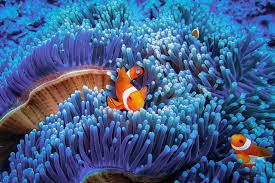Abu Dhabi and Sharjah are taking significant steps to protect their coastal ecosystems as marine conservation efforts gain momentum across the UAE. With increasing concerns over climate change, habitat destruction, and marine biodiversity loss, authorities in both emirates are implementing strategic initiatives to safeguard their rich coastal and marine environments. From expanding marine protected areas to investing in cutting-edge research, these efforts aim to ensure the sustainability of marine life for future generations.
Expanding Marine Protected Areas
Recognizing the importance of preserving marine biodiversity, Abu Dhabi and Sharjah have expanded their network of marine protected areas (MPAs). The Environment Agency – Abu Dhabi (EAD) oversees a growing number of MPAs, including Marawah Biosphere Reserve and Al Yasat Marine Protected Area, which serve as critical habitats for endangered species like dugongs, sea turtles, and coral reefs.
Sharjah, known for its strong environmental policies, has also designated marine reserves to protect coastal habitats and prevent overfishing. The Kalba Mangrove Reserve and Sir Bu Nair Island, a UNESCO-listed marine sanctuary, play a crucial role in conserving marine ecosystems. These protected zones limit human activities, allowing marine species to thrive without disturbances from pollution, coastal development, or unregulated fishing.

Tackling Marine Pollution and Plastic Waste
Marine pollution remains a major threat to the UAE’s coastal waters, with plastic waste, oil spills, and industrial runoff endangering marine species. In response, Abu Dhabi and Sharjah have launched cleanup campaigns and waste management initiatives to reduce ocean pollution.
Abu Dhabi’s “Mission to Zero” campaign aims to cut down single-use plastics and promote recycling, while Sharjah’s waste management authority is intensifying efforts to prevent marine debris from entering the Arabian Gulf. Strict regulations on industrial discharge and offshore activities are also being enforced to mitigate the impact of pollutants on marine life.

Local authorities are partnering with environmental organizations to conduct regular beach and underwater cleanups. Volunteers, divers, and conservationists are actively removing plastic waste from coral reefs and seagrass beds, ensuring the long-term health of marine habitats.
Coral Reef Restoration and Marine Research
Climate change and rising sea temperatures have put coral reefs in the Arabian Gulf at risk of bleaching and destruction. To combat this, marine conservationists in Abu Dhabi and Sharjah are investing in coral restoration projects, deploying artificial reefs, and developing marine research programs to monitor ecosystem health.
The National Aquarium in Abu Dhabi has initiated large-scale coral rehabilitation programs, transplanting coral fragments onto degraded reefs to encourage regrowth. Scientists in Sharjah are also studying resilient coral species that can withstand extreme temperatures, offering hope for the future of reef conservation.
Advanced marine research centers in both emirates are using satellite tracking and AI-driven monitoring systems to study marine species’ migration patterns and assess environmental changes. These efforts provide critical data to guide conservation strategies and policymaking.
Sustainable Fishing and Marine Wildlife Protection
Overfishing has posed a challenge to the sustainability of fish stocks in UAE waters. To address this, Abu Dhabi and Sharjah have introduced stricter regulations on commercial and recreational fishing, including seasonal fishing bans, quotas, and the protection of breeding grounds.
New measures, such as eco-friendly fishing practices and sustainable aquaculture projects, are being implemented to ensure the responsible harvesting of marine resources. Authorities are also working closely with local fishermen, educating them on the importance of conservation and providing alternative livelihood opportunities.
Efforts to protect marine wildlife extend to safeguarding endangered species like hawksbill turtles, which nest along the UAE’s coastline. Conservation programs have been launched to monitor and protect turtle nesting sites, preventing habitat destruction and human interference.
Eco-Tourism and Public Awareness
Promoting eco-tourism is another key aspect of marine conservation in Abu Dhabi and Sharjah. By offering sustainable tourism experiences such as guided snorkeling tours, mangrove kayaking, and wildlife observation programs, both emirates are encouraging responsible interaction with marine ecosystems.
Educational initiatives, school programs, and awareness campaigns are also playing a vital role in engaging the community in conservation efforts. Government agencies and environmental groups are working together to inform residents and visitors about the importance of marine biodiversity and how they can contribute to its protection.
A Sustainable Future for Marine Ecosystems
With strengthened conservation policies, innovative restoration projects, and community involvement, Abu Dhabi and Sharjah are setting new benchmarks in marine environmental protection. As climate challenges intensify, their commitment to protecting the coastal ecosystem serves as a model for other Gulf nations.
By continuing to invest in marine conservation, enforcing sustainable fishing practices, and reducing pollution, the UAE is ensuring that its coastal waters remain vibrant and full of life for generations to come.
Do follow Uae stories for more Updates
Revolutionizing Travel: Abu Dhabi and Sharjah to Be Linked by High-Speed Transport Project












